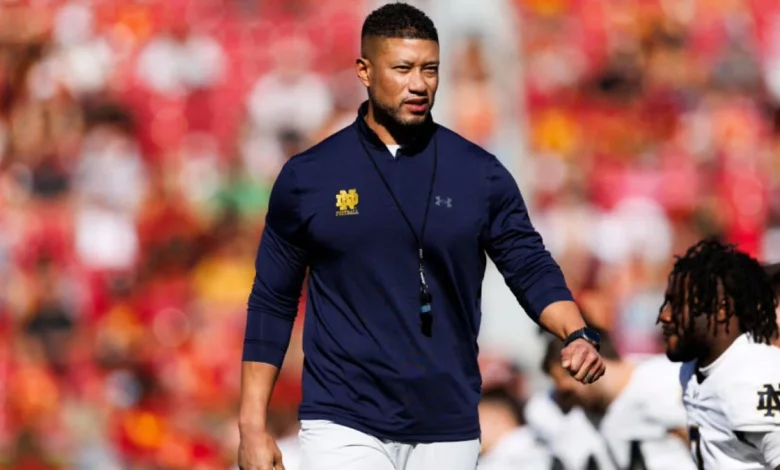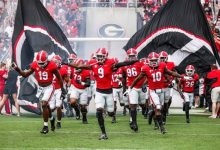Marcus Freeman: “We’ll Play USC Anytime, All the Time” — Notre Dame’s Coach on the Rivalry

College football thrives on tradition, passion, and fierce rivalries that transcend the game itself. Few matchups capture the spirit and intensity of the sport quite like the Notre Dame vs. USC rivalry. Recently, Notre Dame’s head coach Marcus Freeman made a bold and heartfelt declaration: “We’ll play USC anytime, all the time.” This statement not only highlights Freeman’s deep respect for the rivalry but also underscores the timeless significance of one of college football’s greatest showdowns.
In this article, we’ll explore the rich history of the Notre Dame-USC rivalry, analyze Freeman’s comments and what they mean for both programs, and examine the broader implications for college football traditions in today’s evolving landscape.
The Legacy of the Notre Dame-USC Rivalry
The Notre Dame Fighting Irish and the University of Southern California Trojans have been clashing on the gridiron for nearly a century, with their first meeting dating back to 1926. Over the decades, the rivalry has produced unforgettable moments, legendary players, and high-stakes games that have shaped the course of college football history.
Unlike many rivalries that are confined to regional or conference boundaries, Notre Dame and USC represent two storied programs from opposite coasts, blending distinct football cultures and fanbases. This geographic and cultural contrast only fuels the intensity and mystique of the matchup.
The game has often had national implications, influencing championship races and shaping the legacies of coaches and players alike. The tradition of the rivalry includes iconic trophies, passionate fans, and annual anticipation that spans generations.
Marcus Freeman’s Bold Declaration
Marcus Freeman’s statement, “We’ll play USC anytime, all the time,” resonates deeply with fans and analysts alike. It reflects a commitment to preserving the rivalry regardless of scheduling challenges, conference realignments, or external pressures.
Freeman, who took over as Notre Dame’s head coach with a mission to uphold and build upon the program’s proud traditions, understands the importance of rivalries in college football’s fabric. His willingness to embrace the rivalry on any terms underscores a competitive spirit and a respect for history that is essential to the sport.
His comment also comes at a time when many traditional rivalries face uncertainty due to the shifting college football landscape. The emergence of the College Football Playoff, conference realignments, and evolving scheduling demands have placed long-standing games in jeopardy. Freeman’s stance serves as a rallying cry to maintain these cherished matchups.
Why the Timing Doesn’t Matter
One of the key messages in Freeman’s statement is that the timing of the game “doesn’t matter.” Historically, the Notre Dame-USC game was often played late in the season, serving as a climactic finale for both teams. However, recent years have seen shifts in scheduling due to television contracts, playoff considerations, and conference obligations.
Freeman’s attitude suggests that the rivalry’s value transcends when the game is played. Whether the matchup occurs early, mid-season, or at the end, the intensity and significance remain intact. This mindset promotes flexibility while preserving the essence of competition that defines the rivalry.
The Rivalry’s Importance to Players and Fans
For players, competing in the Notre Dame-USC rivalry is a defining experience. It’s an opportunity to step onto a stage steeped in history and pride, representing their school against a worthy adversary. Coaches like Freeman emphasize the motivation and preparation that go into this game, recognizing its impact on player development and team identity.
Fans, too, are deeply connected to the rivalry. Alumni, students, and supporters anticipate the game each year with excitement, viewing it as more than just a contest but as a celebration of community and heritage. The rivalry fosters a sense of belonging and continuity, linking generations through shared memories.
Preserving Traditions in Modern College Football
College football is evolving rapidly, and with change comes uncertainty for traditional rivalries. Conference realignments, playoff expansions, and scheduling complexities challenge the continuity of historic matchups.
Notre Dame’s unique status as an independent football program adds another layer of complexity. The school carefully navigates scheduling to balance tradition, competitiveness, and postseason opportunities.
Freeman’s willingness to play USC “anytime, all the time” highlights the need for cooperation and commitment among programs to preserve rivalries that define college football’s identity. It’s a reminder that some traditions are worth protecting amidst the push for modernization.
Looking Ahead: The Future of the Notre Dame-USC Rivalry
As college football looks toward the future, the Notre Dame-USC rivalry stands as a beacon of enduring passion and competition. Freeman’s words suggest a dedication to ensuring this rivalry remains a fixture on the schedule regardless of external changes.
Both programs have expressed interest in continuing the matchup, recognizing its importance to their legacies and to the sport as a whole. The rivalry is more than a game; it’s a connection to history and a platform for showcasing excellence.
Broader Implications for College Football
Freeman’s comments also reflect a broader conversation about what college football represents in American sports culture. Rivalries like Notre Dame-USC offer more than wins and losses—they create narratives, foster community, and build traditions that transcend the field.
In an era where commercial interests and organizational changes often dominate discussions, maintaining the heart and soul of college football through rivalries is vital.
Marcus Freeman’s declaration that Notre Dame will play USC “anytime, all the time” captures the essence of college football’s passion, tradition, and resilience. His commitment ensures that one of the sport’s greatest rivalries will endure, inspiring players and fans alike for generations to come.
The Notre Dame-USC game is more than just a matchup—it is a celebration of history, competition, and the unbreakable bonds that make college football truly special.









